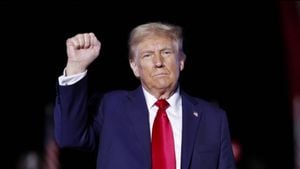With victories across the board, Republicans are reveling in their newfound control of the federal government, having secured the White House, Senate, and House of Representatives. This scenario, often referred to as the "Republican trifecta," opens the door for significant changes to be made to party priorities as they brace for the upcoming two-year legislative session.
For many Republicans, this moment seems to signal not just hope but also urgency. They are acutely aware of the historical patterns surrounding such comprehensive control of government. The last five presidents—George W. Bush, Barack Obama, Donald Trump, and Joe Biden—each experienced periods of unified governance, but often it crumbled shortly after, usually within just two years, due to various factors, including backlash from voters and internal party disputes.
Now, as they prepare to seize the moment, key figures like Representative Nathaniel Moran from East Texas are preparing to push expansive agendas, such as extending the benefits of the 2017 Tax Cuts and Jobs Act, which is slated to expire soon. "If we don’t do anything about these provisions, then Americans are going to see a large tax increase come 2026. We do not want to see it happen," Moran declared. His perspective resonates with many Republicans who feel the need to proactively take action to prove efficient governance and fiscal responsibility.
On the legislative front, the Inflation Reduction Act, which includes various means for tackling climate change and supporting renewable energy initiatives, is under threat. Mariannette Miller-Meeks of Iowa openly critiqued several provisions, signaling her willingness to repeal tax credits for electric vehicle purchases due to overall income levels. The viewpoint reflects the sentiments shared among party leadership, including Senator Shelley Moore Capito of West Virginia, who anticipates swift moves to revoke measures established under the previous Democratic agenda.
Part of the Republican strategy involves scaling down federal oversight and deregulating various sectors, particularly energy. Representative Brett Guthrie of Kentucky, likely to chair the House Energy and Commerce Committee, pointed out, "We need to stop any unspent funds from the green bank of the Inflation Reduction Act from being allocated and to receive oversight on what's already been spent." This focus on accountability aligns with the broader Republican narrative of minimizing government interference.
Historically, unified control—particularly under Republican leadership—has allowed parties to emerge from gridlocked congressional scenarios and enact longstanding legislative desires. For example, under Barack Obama, Congress saw the passage of the Affordable Care Act, and Trump saw the installment of sizable tax cuts. These episodes of rapid legislative churn are often checked by subsequent midterm elections, which can shift power back to the opposing party, resulting in legislative frustration and political instability.
Senator John Cornyn from Texas aptly summed up the current sentiment, "We’ve got a two-year window of opportunity. It’s going to be hard," indicating both optimism and acknowledgment of potential obstacles. Many within the Republican ranks will be tested on their ability to advance legislation through sharp partisan divisions and slim majorities expected within the House.
This minor edge creates urgency, as many party leaders recall the historical backlashes toward previous trifectas. The fate of Republican ambitions hinges on the ability to effectively communicate their successes to voters without losing momentum. Republican Speaker Mike Johnson cited the upcoming Congress as potentially the most consequential, indicating big expectations within the party hierarchy.
Interestingly, the upcoming legislative initiatives are not solely built on extending past achievements. Discussions surrounding regulating energy production and controlling spending have emerged strongly, particularly among GOP circles. This newly minted authority could see debates over energy initiatives and climate changes become even more divisive and perhaps lead to sweeping deregulations. The consistent challenge remains: can they enact these legislative missions swiftly, or will they find themselves mired down as previous Republican-led congresses have observed?
Completely aware of the historical precursors, Republicans are contemplating how quickly they must act before the window of opportunity closes. With this trifecta, many within their ranks are optimistic, yet cautious, eyeing the dangers of overreach which could create more pushback from constituents dissatisfied with sharp partisan contrasts.
Happy to regard these shifts, Democrats, still reeling from recent electoral setbacks, seem poised to capitalize on any missteps by their rivals. Senator Peter Welch from Vermont expressed skepticism about the Republican ability to maintain restraint, observing, "Restraint is one of the more difficult leadership qualities to exercise." The implication here is clear: Democrats believe there will be plenty of opportunities to campaign against perceived overreach.
While the narrative of unified government control cooked up by the Republican establishment carries anticipation and zeal, it also brings along reminders of vulnerability. Maintaining unity will be consequential if Republicans hope to leverage the gains from the upcoming session effectively. Those within the Republican party must reconcile conservative agendas with incoming pressures from various factions and the general electorate as they wade through the upcoming legislative challenges.
The political theater is ramping up, and with the clock ticking down to the next election, will the Republican trifecta deliver on its promises, or is it doomed to repeat the pitfalls of the past? The upcoming months will undoubtedly provide clarity on this matter, especially as they navigate through complex party divisions and the realities embedded within upholding promises made to voters.



